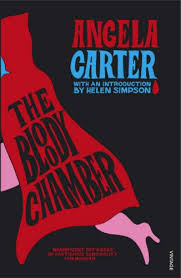If your tastes run more along the lines of Disney then The Bloody Chamber is definitely not for you. Turn back now. You have been warned and you continue at your own peril. A collection of ten short stories, The Bloody Chamber, written by Angela Carter, takes the classic fairytale and twists it out of shape to create something erotically disturbing, exploring the power relationships between men and women.
Inspired by the well-known fairytales of Blue Beard (The Bloody Chamber), Beauty and the Beast (The Tiger’s Bride and The Courtship of Mr Lyon), Puss-in-Boots (Puss-in-Boots), Little Red Riding Hood (The Werewolf and The Company of Wolves) and other tales, Carter delves into and emphasises the classic fairytales’ dark side and in the end exposes our own shadowy nature.
This “exotic new hybrid” (Intro Simpson vii) of storytelling has the hint of feminism and is symbolically rich and unbelievably satisfying although you probably wouldn’t want to admit it. Characters are depicted in uncomfortable and surreal environments and it is shocking and horrific, yet somewhat hauntingly wonderful. It reveals to us another side of ourselves that will leave you shamed, embarrassed or enlightened, possibly all three.
Each tale has been corrupted and perverted; bringing forth the fairytales’ original sinister roots that has been smoothed over and concealed by contemporary writers and translators. Punishment, eroticism and murder were once upon a time the main themes of fairytales and used to serve as a warning to children and adults alike, not just to entertain. Carter reverts back to the nightmares, the cruelties and the wonders of fairytales and creates a somewhat more realistic world.
Using vivid yet potent imagery, Carter leads us down the garden path into the waiting wolf’s embrace, distorting the modern idea of fairytales and giving us a good dose of the poison apple. You will laugh, you will cry and you will cringe at every narrow twist and turn Carter’s stories ingeniously weave but “one false step and into the abyss of the dark you stumble” (Carter 27).
Again I warn you.
These stories, connected by a nearly invisible thread of time and theme, are not the tales to tell children at bedtime, in fact I recommend that these tales should never be read at night. Werewolf grandmothers, sexually dominating Red Riding Hoods and Beauty transforming into the Beast are considerably mild in comparison to the darker notions of sexuality, desire, lust, curiosity and even the tabooed act of necrophilia. Nothing is sacred to Carter and she expels all the allusions of fairytales and presents to us a world tainted and grotesque yet surprising with a hint of the romantic. You must be prepared for anything when opening the pages into the magical realm of Angela Carter. I challenge you to read on!
“See! Sweet and sound she sleeps in granny’s bed, between the paws of the tender wolf” (139).
Reader take heed, this is not for the faint of heart.

